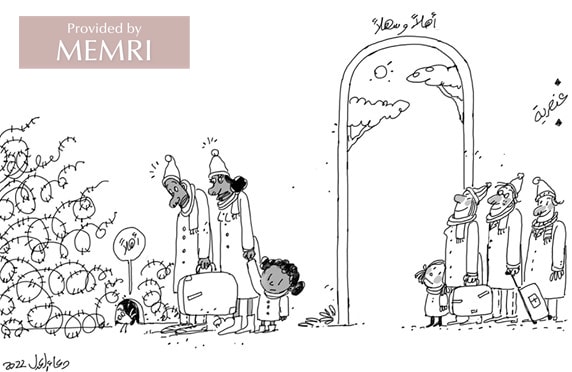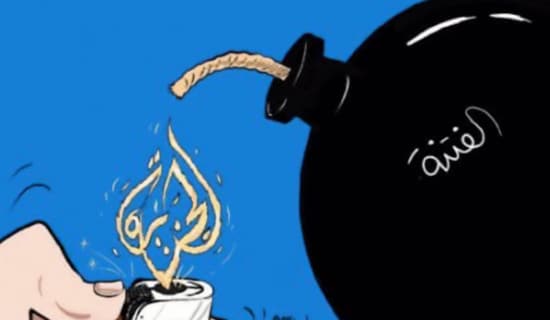In response to criticism recently voiced in the Arab media, which accused Europe of discriminating between the refugees from Ukraine, who are received with warmth, and those from the Middle East and Africa, who are not, two Arab journalists published articles that rejected this criticism, stating that the Arabs should learn from the fraternity, solidarity and humanity shown to refugees in the West. The articles noted that the West actually did receive the waves of Arab and African refugees with generosity and respect, while the Arab countries themselves do not show warmth or compassion even to Arab refugees. One of the journalists called on the Arabs to respect themselves before expecting others to respect them, and the other urged them to admit that Arabs would not have so readily welcomed Western refugees into their countries.
The following are translated excerpts from these articles:

Cartoon titled "racism" in Egyptian daily: The Ukrainian refugees are welcomed in Europe, while dark-skinned refugees are not.
Al-Jazeera Host: Instead Of Condemning Europe For Its Treatment Of Refugees, Arabs Should Learn Compassion And Solidarity From The Europeans
Syrian journalist and Al-Jazeera host Faisal Al-Qassem wrote in his weekly column in the London-based Qatari daily Al-Quds Al-Arabi that the Arabs should not criticize the West for its treatment of Arab refugees when Arab countries show no compassion or respect to Arab refugees or even to their own citizens. He wrote: "One cannot help mocking or laughing these days when one sees Arabs on social media attacking the West for its warm welcome of the Ukrainian refugees. Social media users in many Arab countries are extensively accusing the West of hypocrisy because of its policy towards refugees coming from the Middle East or the Third World versus those coming from Ukraine.
"First, we must acknowledge that the Arabs are the last people who have the right to condemn the West about human rights or talk about hypocrisy. We certainly condemn the slips of the tongue made by some Western reporters, journalists and media figures who made unpalatable comparisons between the Arab and Ukrainian refugees, saying that the latter's blue eyes and white skin make them worthier than the victims of the wars in the Middle East.[1] But before we hand out awards for human rights, equality and human fraternity, we must look at the Arab reality. Is our conduct nobler and more humane than that of the Europeans'? Furthermore, why do we condemn the world for discriminating between us and the Ukrainians or others, when we oppress each other more than any foreigner oppresses us?
"Do countries that exchange the body of one Israeli soldier for hundreds of Arab prisoners have the right to demand the same treatment as the citizens of countries that respect themselves and their peoples? When one Israeli soldier is worth hundreds of Arab prisoners, we must not condemn foreigners for treating us with derision and contempt… Nobody will respect you if you do not show the slightest respect for yourself. How do you expect the Westerners to respect you when they know that Syrian [President] Bashar Al-Assad… dropped barrel bombs on residential areas throughout Syria as though playing some sort of computer game? Even hunters in the African jungle avoid shooting certain animals, including predators, but the Syrian regime exterminated Syrians with chemical weapons the way you kill mosquitoes with insecticide. Of course, I am not blaming the Syrians for being victims. I blame the regimes that disrespected their peoples and, as a result, were disrespected by the world. So I do not understand the condemnations and the anger [at the West]! Had our rulers had any respect for us and our homelands, we would have forced the world [to respect us]. But whoever is disrespected in his own homeland is not respected outside of it.
"When you come from a strong and honorable country where your rights are respected and protected, others will surely respect you and your human rights. But when you come from a country that does not honor your most basic human rights, do not be surprised to be treated with derision. Therefore, before condemning others for their humiliating, disrespectful or arrogant attitude towards you, ask yourself: Do you come from a country that respects its people at all? Does your country consider you important, so that others should take an interest in you?
"Come on, notice the difference: Israel rushed to rescue the Jews who were stranded in the war zone in Ukraine and sent a fleet of planes to bring them back, whereas the Syrian regime is sending thousands of Syrian mercenaries to [fight and] die in Ukraine. [Some] countries do the impossible to save their citizens, [while in our part of the world] gangs destroy their own countries, murder and expel millions and exploit [their plight] with the utmost insolence.
"Shouldn't the Arabs learn solidarity and sympathy from the Europeans? Look how the Arab states treated the waves of Syrian, Iraqi, Yemeni, Libyan, Afghan and other refugees, and compare this to the European eagerness and generosity. Not to mention the wretched camps in which some Arab countries housed the Syrian refugees. [These camps] are hellish, since these countries, which received billions of dollars in order to care for the refugees, exploited them instead, and used them as bargaining chips [to pressure] the donor countries. The Gulf states host millions of Arabs and deserve praise for this, but how many refugees from wretched countries have they [actually] received in the last ten years?
"Here is an important remark: Before condemning the West for welcoming the Ukrainian refugees, you should thank the West for receiving the Arab refugees with much greater kindness, respect and humanity than the Arab countries ever showed them. Europe hosted millions of refugees and officially opened its doors to them. Germany alone hosted about a million Syrian refugees, and before them Lebanese, Palestinian and Iraqi refugees, [despite] knowing that the Arabs and Europeans have no national, ethnic or religious ties. So why is it so surprising that Europe welcomes its coreligionists and cousins, the Ukrainians?... Don't be angry at the West just because it occasionally helps Europeans more than it helps others. When the Arabs and Muslims help each other with the same enthusiasm, you will be entitled to condemn others… Compare the mutual aid and solidarity among the Europeans to the mutual aid and solidarity among the Arabs, and note the difference. So do not denounce Europe for opening its borders to the Ukrainian refugees, welcoming them with flowers and generously providing them with every kind of assistance. Instead, try to treat one another with the fraternity you see in Europe. Yes, the Europeans treat one another with fraternity."[2]
Algerian Journalist: Had The Situation Been Reversed, The Arab States Would Not Have Welcomed European Refugees
Algerian journalist Tawfiq Rabahi, also a columnist for Al-Quds Al-Arabi, wrote that the Arab refugees in Europe constitute a social, cultural and religious burden for the European societies, and that they bear some of the responsibility for the hostility they encounter because they are reluctant to integrate and sometimes even challenge the core values of the countries that host them. He added that Arabs would have been equally reluctant to accept European Christians as refugees in their countries, especially considering that they do not welcome even Arab refugees. He wrote: "The sympathy shown to the families of Ukrainian refugees [who have been fleeing to Europe] since the beginning of the Russian invasion of Ukraine three weeks ago caught the attention of the world… It is difficult not to compare the reception of the refugees from Ukraine to the reception of the Arab, Muslim and African refugees who have come to Europe in the last two decades, likewise fleeing wars and conflicts, some of which were worse than what is happening in Ukraine today.
"[But] realistically, there is nothing puzzling about this. The rejection of our refugees was expected, and so was the welcome extended to the Ukrainians. Whoever expected otherwise should rethink some perceptions… 'Our' refugees were treated badly because they are foreign to their surroundings and their presence is a heavy burden for the European societies. The Ukrainian refugees were treated with gentle humanity because they belong to the societies to which they migrated and are not a burden on them. The burden represented by our refugees is not confined to material and financial [level] and to the care [they require], but, more importantly, also extends to the cultural, social and religious levels, and this has a long-term impact on European society.
"The Arab and Muslim refugees arrive in Europe with an ocean of desires, internal conflicts and concerns. When they have trouble resolving them, they abandon them, or in some cases impose them on the new society. The Ukrainian refugees, on the other hand, like millions of migrants from Eastern Europe before them, are free of all this mental, cultural and social baggage. They do not question [the need to] integrate, do not disagree with the fundamental principles of the society that opened its doors to them, and do not demand special food or a different dress code for their children in school…
"The sense of injustice and discrimination, and the inferiority complex displayed in the last few days by the Arab and Eastern societies that export the refugees, are understandable, given the scope of the deliberate discrimination shown to people just based on their different appearance and cultural heritage…
"But it is important to understand that, on the periphery of the raging [military] wars, the world is [also] experiencing a culture war between East and West, and the large wave of refugees and the difficulty of absorbing them is one of the symptoms [of this war]. Just as our own societies are very concerned about the future, the Western societies feel a similar fear of the 'other' who comes from afar 'to threaten our way of life and way of thinking'…
"We must acknowledge that the refugees coming from the East bear some responsibility for feeding the hatred they encounter in their new societies. When we understand these facts, the comparison between 'our' refugees and 'their' refugees does not irritate us as much and we are no longer hurt by the fact that some Western politicians and media figures praise the Ukrainian refugees as 'educated' and as 'blond Europeans' who fled in cars 'just as nice looking as ours,' etc….
"Acknowledging reality should give us the courage to face ourselves and ask questions that need to be asked, such as: What would happen if the situation was reversed and our societies were the ones receiving the refugees? Would they welcome the blond Christian Europeans with open arms? This leads to additional questions, much more painful: Did Lebanon receive the Syrian refugees with flowers? Why did Morocco and Algeria come to the brink of a [diplomatic] crisis over 50 Syrian refugees?[3] Do any of you know of a Saudi family who opened its home to a Yemeni family?... Has any of us asked why African refugees prefer to drown in the depth of the sea rather than stay in Libya or Morocco, for instance?
"I know that [some] Arab societies are completely exhausted and that their economic situation is dire, but that does not justify everything, [such as] the racist behaviors and expressions that sometimes appear at the entrance to houses of worship. I am not afraid to say that our societies would have behaved the same way towards the other even if they had been wealthy. This issue is much larger than poverty and economic hardship, because poverty sometimes causes people to regain their humanity."[4]
[1] See MEMRI Special Dispatch No. 9823 - Arab Writers Decry 'Racist', 'Hypocritical' Western Coverage Of Ukraine War: When The Wars And Refugees Were Middle Eastern, The West Kept Silent – March 14, 2022.
[2] Al-Quds Al-Arabi (London), March 19, 2022.
[3] In April 2017, Morocco accused Algeria of forcing 54 Syrian refugees to cross illegally into Morocco and summoned the Algerian envoy to express concern about this (Khaleejonline.net, April 23, 2017).
[4] Al-Quds Al-Arabi (London), March 15, 2022.




